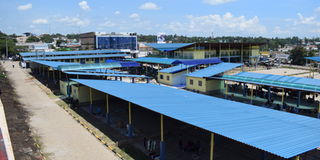Homa Bay traders count losses after Kenya Power cut electricity supply to market

Homa Bay Town modern market.
More than 500 traders in Homa Bay town are counting their losses after Kenya Power disconnected electricity supply to Homa Bay Municipal Market due to unpaid bills.
Traders at the market said they had not had electricity for a month after the supply was cut off.
This has put Homa Bay County government officials in charge of paying utility bills on the spot, as traders pay rent and revenue to Governor Gladys Wanga's administration, which is supposed to address most of their challenges.
Some traders said they were on the verge of shutting down their businesses because most of the machinery in their shops are completely dependent on electricity.
Kenya Power County Electricity Manager, Ken Okumbe, confirmed that power supply to the market had been cut due to accumulated bills.
"We have disconnected power to the market because of non-payment of bills. Other departments are also affected," he said.
Officials representing the traders said whoever was responsible for paying the market's bills was doing them a disservice and had left them in the dark, resulting in losses running into millions.
Mr Jack Nyambega and Mr Godfrey Okoth said electricity was an essential part of their daily operations and any interruption would result in losses.
Investigations by the traders revealed that the devolved unit has to pay Sh600,000 for power to be restored.
Mr Nyambega said the market has salons, hairdressers, retail shops and other businesses that cannot operate without electricity.
"Some traders have resorted to shutting down their businesses because they cannot be in the market if there is no power. Most of them use electronic gadgets which are now switched off," he said.
The power cuts have also reduced the number of hours traders spend at the market.
Some used to stay at the market until 10pm when there was electricity.
Their shops and the whole market were illuminated at night.
Mr Nyambega said most people now close up shop by 6pm because of the darkness.
A few traders use solar lights, which they say are not effective.
"We are facing possible burglaries because of the darkness. Criminals may take advantage of the situation to steal from us," said Mr Nyambega.
As traders wait for power to be restored, some have begun to adapt to the new business environment.
Traders who run butcheries have taken refrigerators home where they can operate.
Mr Okoth said meat that is not sold during the day should be kept fresh at night and sold the next day.
But with no electricity in the market, there was no reason for traders to keep refrigerators in their shops.
"Every evening, the traders take their perishable goods home for proper storage. It is a tedious task, but it is the best thing to do in this situation," said Mr Okoth.
Calls to the trade executive, Mr Polycarp Okombo, were not returned.
Mr Nyambega said the solution to the problem was to give each trade its own electricity meter.
Currently, traders share meters paid for by the county government.
"Some traders use electricity indiscriminately. This makes the bill very high," he said.





